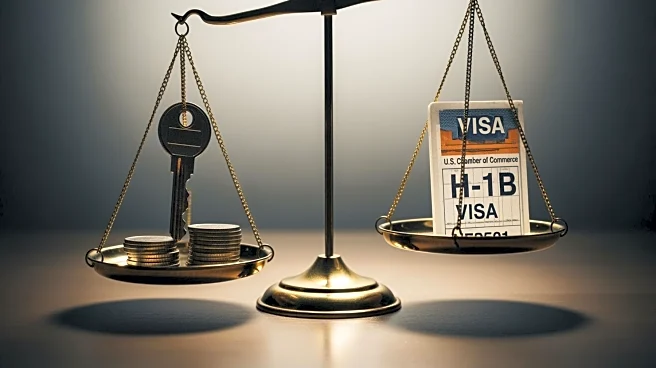What's Happening?
The U.S. Chamber of Commerce has filed a lawsuit against the Trump administration, contesting a new $100,000 fee imposed on H-1B visas. The lawsuit, filed in the U.S. District Court for the District of Columbia,
argues that the fee violates the Immigration and Nationality Act. The Chamber of Commerce, a major business advocacy group, claims the fee is both misguided and unlawful, and seeks to have it blocked by the court. The fee, introduced by President Trump through an executive order, is intended to deter companies from using the H-1B program for entry-level employees and encourage recruitment of highly skilled workers. The Chamber asserts that the fee will make it prohibitively expensive for U.S. employers, particularly startups and small businesses, to access global talent necessary for growth.
Why It's Important?
The lawsuit highlights significant tension between the Trump administration and the business community regarding immigration policy. The H-1B visa program is crucial for many U.S. industries, particularly technology, which rely on foreign talent to fill specialized roles. The Chamber of Commerce's legal challenge underscores concerns that the new fee could hinder economic growth by limiting access to skilled workers. This move could impact various sectors, including manufacturing, finance, education, and healthcare, which also utilize the H-1B program. The outcome of this legal battle may set a precedent for how immigration policies are shaped and enforced, affecting the ability of U.S. businesses to compete globally.
What's Next?
The court's decision on the lawsuit will be closely watched by businesses and policymakers. If the Chamber of Commerce succeeds, it could lead to a rollback of the fee and influence future immigration policy decisions. Conversely, if the fee is upheld, businesses may need to adjust their hiring strategies, potentially increasing reliance on domestic talent or seeking alternative visa options. The Trump administration's stance suggests a continued focus on prioritizing American workers, which may lead to further policy changes affecting immigration and employment practices.
Beyond the Headlines
The legal challenge raises broader questions about the balance between protecting domestic employment and fostering economic growth through international talent. It also touches on the ethical considerations of immigration policy, such as the fairness of imposing high fees on companies seeking to hire foreign workers. The case may prompt discussions on the role of immigration in sustaining innovation and competitiveness in the U.S. economy.










